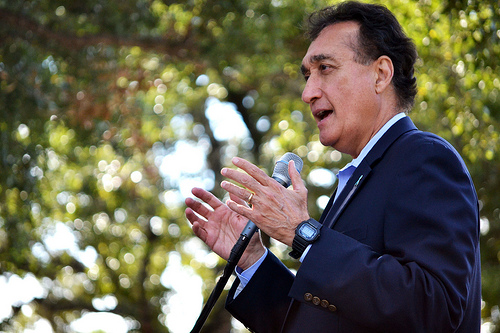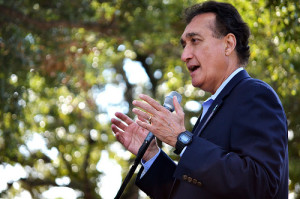Henry Cisneros: The Nation Under estimated Impact of Foreclosure Crisis

 By Susana, G. Bauman, Voxxi
By Susana, G. Bauman, Voxxi
A former Secretary of Housing and Urban Development, Henry Cisneros believes the banking sector has not done all they could in the foreclosure crisis
 Adding that the review process was too costly—an estimated $1.5 billion has been paid to consultants and third party reviewers—and it was taking too much time—the review has been ongoing for over a year. Regulators decided to stop the investigation and spread $3.3 billion among 3.8 million homeowners. The balance will help with loan modification programs to homeowners still underwater or struggling with payments.
Adding that the review process was too costly—an estimated $1.5 billion has been paid to consultants and third party reviewers—and it was taking too much time—the review has been ongoing for over a year. Regulators decided to stop the investigation and spread $3.3 billion among 3.8 million homeowners. The balance will help with loan modification programs to homeowners still underwater or struggling with payments.
“It is unfortunate that this settlement is about abuses that occurred in the recovery process but it is not part of the long term solution. It was a necessary step but not a great contribution to solve the problem of foreclosures,” Henry Cisneros, former Secretary of Housing and Urban Development and former Mayor of San Antonio, Texas, told VOXXI.
Cisneros believes the entire nation underestimated the impact of the foreclosure crisis in the overall economic recovery process not only zapping consumer confidence but also leaving homeowners threatened by foreclosures hanging from the banking and financial sector.
The crisis kept prices low in the real estate market, dragging sales and preventing new home builders from competing with those low prices. “The foreclosure was right at the front of the economic recovery and contributed greatly to the slowness and the flatness of the recovery,” Cisneros said. “Although in the last year and a half the Administration has really stepped up and launched a number of different programs, I believe the banking sector has not done all they could.”
Cisneros, like many borrowers’ advocate, sustains that banks could have done more with principal adjustment options, extensions and other approaches in refinancing mortgage loans to help those homeowners who wanted to stay in their homes but just needed some help.
“The process seems to have followed a pattern in which banks were not held accountable enough throughout this whole crisis. The Administration—from Secretary Geithner down—probably felt the turndown was so severe that they couldn’t put the banks over the cliff, but I know some people would disagree with this reason,” Cisneros stated.
Henry Cisneros’ career and impact on Latino community
As former Secretary of Housing and Urban Development—office he held between 1993 and 1997— Henry Cisneros considers that the focus should have been on the housing dimension of the crisis and not on the stimulus. “The core was the housing aspect of the crisis since the onset,” he affirmed.
During his time in office at the federal level—and throughout his life—Cisneros has been known for his tireless battle for fair housing policies and economic improvement for low-income Americans. He extended access to home loans and penalized an increasing number of lenders who discriminated against ethnic or minority borrowers by easing the process to file fair lending complaints.
Cisneros held this office during the first Clinton Administration. He had cross paths with the Clintons at the time he was Mayor of San Antonio and Bill Clinton was Governor of Arkansas.
“Clinton had invited me to speak at several events regarding public health clinics and strategies when he started to refine his national public health thinking, and we got to know each other,” Cisneros said.
From 1981 to 1989, Cisneros was elected for four terms as the second Hispanic Mayor of San Antonio. His time in office was dedicated to enhance the economics of the city, from reducing poverty to increasing wages and economic momentum.
Being that San Antonio is a largely Latino populated city—55 percent of its inhabitants are of Hispanic origin—Henry Cisneros campaigned among his community extensively, but once he became Mayor he had to make a practical decision. “I had to decide how much time I gave to a national Latino agenda and how much attention to being a good Mayor for all citizens in San Antonio, traditional Texans, African-Americans, Asians and Latinos equally,” he said.
His accomplishments really turned around the—at the time—tenth largest U.S. city, bringing federal and private funding to achieve economic development, revitalize downtown areas, build a 65000-seat stadium and attract companies and technology to create jobs and train skilled human resources.
San Antonio, now the seventh largest city in America, employs one of every six workers in the health care and bioscience industries, an effort Cisneros launched as Mayor. He also sought global investments mainly from Mexico and Japan to develop manufacturing and technology ventures, and extended infrastructure to integrate poor surrounding areas.
During his time, the city attracted two major players from the entertainment industry: the SeaWorld San Antonio, a 250-acre marine mammal park, aquarium and theme park; and Six Flags Fiesta Texas, the famous theme park owned by Six Flags. Both projects increased tourism traffic and enhanced the hospitality industry.
But maybe his main accomplishment was to create collaborative efforts to resolve old racial and ethnic tension in the community.
“I grew up in a city that suffered from many years of discrimination and economic disparity and there was great unfairness in the city. I also grew up at the time the Civil Rights movement was sweeping the country. Dr. King, Julian Bond, Barbara Jordan, Andrew Young and other leaders were my heroes. While I was not at the forefront of the Latinos Civil Rights, I thought we could use institutions of government, business and the city to improve the agenda of voting rights, civil rights and economic opportunities for all,” he said.
“I’m glad to say that San Antonio is a very different place today, works have continued and it is a very progressive city. I’m happy to see it being led by Major Julian Castro,” Cisneros affirmed.
Henry Cisneros: Latinos are a work in progress
Working in the private sector, Henry Cisneros has not diminished his active public participation. He has served as President of the National League of Cities, as Deputy Chair of the Federal Reserve Bank of Dallas and is currently an officer of Habitat for Humanity International. He is currently an Advisory Board member of the Bill and Melinda Gates Foundation and the Broad Foundation. He is also the Chairman of the San Antonio Economic Development Foundation.
Cisneros plans to continue with his quest. “Latinos are very much a work in progress. They are the poorest population in the country and will be for some time as we have constant influx of immigration. I will continue to work towards Latino immigrants’ integration through a non-profit organization my wife and I run from our home-office,” he shared.
With the very possible perspective that immigration reform will come to pass in President Obama’s second term, Henry Cisneros sees a challenge and an opportunity for immigrant Latinos.
“The challenge is their present poverty, lack of education and daunting barriers that keep them in a secondary class for generations. The opportunity is to educate and prepare America’s newest immigrants so their contributions of work, economic potential and brainpower help build the nation. I plan to dedicate the next decade of my life to this effort,” he concluded.
Henry Cisneros on homeownership
This article was first published in Voxxi.
Susana G Baumann is the Director of LCSWorldwide. A multicultural expert, a business blogger & a published author.
[Photo by UrologySanAntonio]
